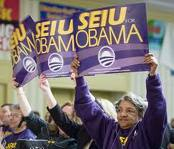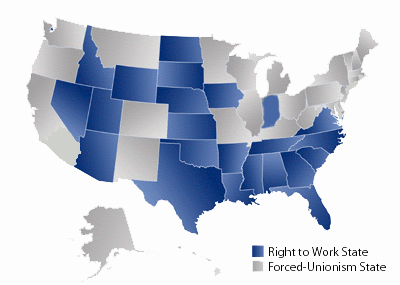Big Labor's Model City: Detroit
Michael Barone, senior political analyst for the Washington Examiner, looks at the once vibrant city of…
Michael Barone, senior political analyst for the Washington Examiner, looks at the once vibrant city of…

Right to Work Fights Back Against 'Illegal' NLRB Appointments (source: National Right To Work Committee February 2012 Newsletter) Under Article II, Section 2 of the U.S. Constitution, the President has the power to appoint "officers of the United States," but only "by and with the advice and consent of the Senate." The Constitution makes it clear that only in cases when "vacancies . . . happen during recesses of the Senate" may the President make temporary "recess" appointments to offices that normally require confirmation by Congress's upper chamber. Unfortunately, in his eagerness to please union officials Inside the D.C. Beltway, a tiny but crucial constituency for his re-election bid this year, Democratic President Barack Obama is now seeking to render the Constitution's "advice and consent" requirement for executive appointments effectively meaningless. Early this January, the Senate was not in recess. For several weeks starting last December 20, the Senate was instead in a "pro forma" session during which it did not meet every day, but did periodically conduct business under "unanimous consent" agreements. No one can reasonably argue that this "pro forma" session was tantamount to a recess. Article I, Section 5 of the Constitution states that neither the House nor the Senate may over the course of a Congress "adjourn for more than three days" without "the consent of the other." A La Humpty Dumpty, Mr. Obama Insists 'Recess' Means Whatever He Says It Means As syndicated columnist Michael Barone has explained: "The House did not consent to the adjournment of the Senate this year, so there is no recess, and hence no constitutional authority to make recess appointments."

Right to Work Fights Back Against 'Illegal' NLRB Appointments (source: National Right To Work Committee February 2012 Newsletter) Under Article II, Section 2 of the U.S. Constitution, the President has the power to appoint "officers of the United States," but only "by and with the advice and consent of the Senate." The Constitution makes it clear that only in cases when "vacancies . . . happen during recesses of the Senate" may the President make temporary "recess" appointments to offices that normally require confirmation by Congress's upper chamber. Unfortunately, in his eagerness to please union officials Inside the D.C. Beltway, a tiny but crucial constituency for his re-election bid this year, Democratic President Barack Obama is now seeking to render the Constitution's "advice and consent" requirement for executive appointments effectively meaningless. Early this January, the Senate was not in recess. For several weeks starting last December 20, the Senate was instead in a "pro forma" session during which it did not meet every day, but did periodically conduct business under "unanimous consent" agreements. No one can reasonably argue that this "pro forma" session was tantamount to a recess. Article I, Section 5 of the Constitution states that neither the House nor the Senate may over the course of a Congress "adjourn for more than three days" without "the consent of the other." A La Humpty Dumpty, Mr. Obama Insists 'Recess' Means Whatever He Says It Means As syndicated columnist Michael Barone has explained: "The House did not consent to the adjournment of the Senate this year, so there is no recess, and hence no constitutional authority to make recess appointments."

Trying to increase the number of workers who are forced to pay union dues as a condition of employment is perhaps the TOP priority for President Obama at the moment. Michael Barone takes the president to task for his consistent refusal to say no to the union bosses. Here is his rundown: [Obama] certainly can demonstrate that he cares about certain jobs -- the 7 percent of private-sector jobs and 36 percent of public-sector jobs held by union members. During his two years and nine months as president, he has worked time and again to increase the number of unionized jobs. Some pro-union moves have a certain ritual quality. Democratic presidents on taking office seek to strengthen federal employee unions. Fully one-third of the $820 billion stimulus package passed almost entirely with Democratic votes in 2009 was aid to state and local governments. This was intended to keep state and local public employee union members -- much more numerous than federal employees -- on the job and to keep taxpayer-funded union dues pouring into public employee union treasuries. In arranging the Chrysler bankruptcy, the Obama White House muscled aside the secured creditors who ordinarily have priority in bankruptcy proceedings in favor of United Auto Workers [union]. That's an episode that I labeled "gangster government." Former Obama economic adviser Lawrence Summers protested that his White House colleague Ron Bloom had made similar arrangements before. But in those cases Bloom was working for the unions, not for a supposedly neutral government.

The 22 states with right-to-work laws grew 15% in the last decade. The others grew 6%. Michael Barone writes. Sign-Up For NRTWC’s Free Daily E-mailed Update Summary…

From RealClearPolitics by Michael Barone : “The 22 states with right-to-work laws grew 15 percent in the last decade. The other states grew just 6 percent. The 16 states where collective bargaining with public employees is not…
The widely respected political journalist Michael Barone's take on the battle of Wisconsin: Everyone has priorities. During the past week Barack Obama has found no time to condemn the attacks that Libyan dictator Moammar Gadhafi has launched on the Libyan people. But he did find time to be interviewed by a Wisconsin television station and weigh in on the dispute between Republican Gov. Scott Walker and the state's public employee unions. Walker was staging "an assault on unions," he said, and added that "public employee unions make enormous contributions to our states and our citizens." Enormous contributions, yes -- to the Democratic Party and the Obama campaign. Unions, most of whose members are public employees, gave Democrats some $400 million in the 2008 election cycle. The American Federation of State, County and Municipal Employees, the biggest public employee union, gave Democrats $90 million in the 2010 cycle. Follow the money, Washington reporters like to say. The money in this case comes from taxpayers, present and future, who are the source of every penny of dues paid to public employee unions, who in turn spend much of that money on politics, almost all of it for Democrats. In effect, public employee unions are a mechanism by which every taxpayer is forced to fund the Democratic Party.